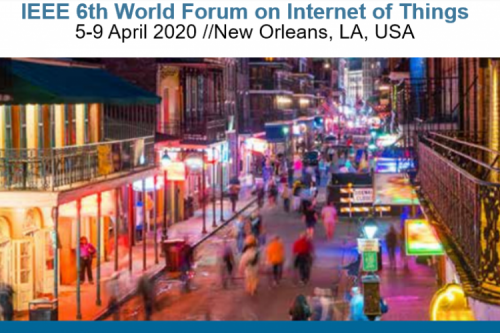Call for Papers ( WF-IoT2020 )
Special Session on IoT for Emergency Response and Disaster Recovery
Call for Papers
5‐9 April 2020 – New Orleans, Louisiana, USA
Overview
Natural and manmade disasters can occur unpredictably and range in severity from something locally manageable to large scale events that require external intervention. Smaller scale events typically involve local law enforcement and emergency responders. On the other hand, when large scale disasters occur, they can cause widespread damage and overwhelm the ability of local governments and authorities to respond. In such situations, Civil-Military Cooperation (CIMIC) is essential for a rapid and robust response.
Across the spectrum of these operations, IoT, Smart Cities, and Smart Environments can significantly improve the ability of emergency responders to quickly understand the situation and conditions (also known as developing Situation Awareness). IoT can help with assessing potential damage that has been caused (e.g., to the city infrastructure, communications and power grid, road conditions, transportation services, etc.). Application of IoT to supply chain management can provide very rapid insights into the logistical situation and effect faster resupply of critically needed materials. Usercentered IoT services can enable victims to help each other, thereby accelerating the recovery effort. Finally, pervasive deployment of IoT in the context of hospitals and medical services can improve triage and care for those in need.
Scope and Topics
The scope and technical topics of interest include, but are not limited to:
•Smart city monitoring and leveraging services in smart city environments for disaster response and other activities.
•Integration of IoT capabilities into Emergency Response Centers.
•Requirements, examples, and use cases for deployment of IoT for disaster relief and emergency response.
•IoT data analytics and visualization for emergency response.
•Applications of IoT for logistics and supply chain management, especially in the context of disaster relief.
•Applications of IoT for emergency medical response, including monitoring of hospital conditions (availability of space, supplies, and needed expertise / equipment).
•Novel integration of IoT‐based physiological monitors and emergency responders for triage.
•IoT to monitor critical infrastructure, including power grid, transportation, and communications.
•Challenges and solutions to deploying and using IoT in degraded environments (e.g., when infrastructure, communications, and electrical power may be limited).
•Architectural aspects of bridging civilian and military IoT infrastructure, including security, information, and communication architectures, work flow / business processes, interoperability and Integration of disparate technologies.
•Information management challenges for military application of IoT – trustworthiness, pedigree, provenance, and enabling military commanders and missions to benefit from IoT generated information.
•Examples of physical instantiations of military IoT systems built from commercially available elements and architectures.
•Security challenges related to co‐existence and interconnection of military and civilian IoT networks.
•Challenges related to reliability and dependability, especially when IoT becomes mission critical.
•Zero‐configuration or other approaches to simplify the deployment and configuration of IoT, especially in coalition settings where disparate IoT resources need to coexist and interoperate.
•Knowledge discovery, including semantic and syntax discovery of information provided by IoT.
•Challenges related to actuation of IoT devices, especially with real‐time requirements
•Power challenges for tactically deployed IoT devices.
Important Dates
Paper Submission Deadline:
January 31 th , 2020
Acceptance Notification:
February 29 th , 2020
Camera Ready Submission:
March 15 th , 2020
Organizers
Dr. Niranjan Suri
US Army Research Laboratory Adelphi, MD
Dr. Konrad Wrona
NATO Communications and Information Agency
The Hague, The Netherlands
Dr. Frank T. Johnsen
Norwegian Defence Research Institute (FFI), Kjeller, Norway


